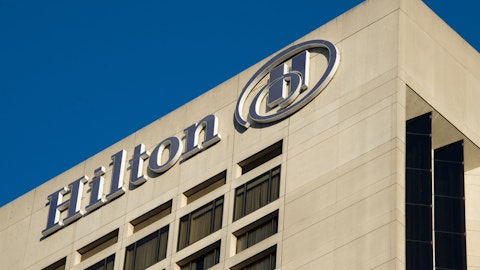Operator: Thank you. The next question is from Duane Pfennigwerth with Evercore ISI. Please go ahead.
Duane Pfennigwerth: Hi. Thanks. I appreciate it. Just coming back to the fee rate growth, if we just look at fees as a percentage of total room rev, can you speak to what drives seasonality, if anything, on this percentage. And in terms of the year-over-year improvement, you showed nice improvement here in the first quarter. Can we hold on to that as we progress through the year, or is it lumpy? Thank you.
Kevin Jacobs: Sorry, Duane, I didn’t quite catch the first part of your question.
Duane Pfennigwerth: Just the fee rate growth, which you showed nice improvement on year-over-year total fees as a percentage of room rev, is there seasonality on that percentage? And if so, what drives it? In other words, you made nice progress here in the first quarter. It’s one of the concepts you talked about in your Investor Day is sort of raising royalty fees, etcetera. Is there anything specific to the first quarter that’s kind of non-recurring, or can we hold on to that improvement as we progress through the year?
Kevin Jacobs: Yes. I think it’s a bit of both without getting into too much detail. There was a touch of the timing was in fees, but a lot of it is strength. And like I said earlier in one of my answers, in the parts of the world where our managed business is bigger and the segments in the U.S. with urban hotels where our managed business is bigger, we think incentive management fees will continue to be a strong contributor over the course of the year, and that’s sort of all baked into our guidance, so no anomalies in there.
Operator: Thank you. The next question comes from Michael Bellisario with Baird. Please go ahead.
Michael Bellisario: Thanks. Good morning.
Chris Nassetta: Good morning.
Michael Bellisario: Two parts for you on loyalty. Just first, what was Honors occupancy in the quarter? And then bigger picture, just aside from offering customers more options, how are you driving how are you thinking about incremental engagement? I know you are still having to educate travelers about loyalty and the benefit of loyalty, especially compared to all the book direct and marketing campaigns you had to do pre-pandemic? Thanks.
Chris Nassetta: Yes. Honors occupancy was, I think at our historical high, 64% and change up like 300 basis points to something – a little over 300 basis points year-over-year. And so Honors is working. Our customers are engaged more than I think any other program that is out in the industry. We do have a bunch of things that we are doing. Some of them you have seen that are – what we are doing with SLH, what we are doing with AutoCamp, you should expect to see more not like Graduate type things, but more partnerships particularly in the experiential area. I think I talked about it on the last call, so more AutoCamps, I think areas like Safaris and yes and other riverboat crews and other things because we know that our customers, those are adjunct sort of travel experiences that connect to our business that gives our base of customers, incremental things to engage with us that they want to do and is not in conflict in any way with our business, but we think is synergistic.
And so there are a bunch of other things that we are doing that. But in reality, our expectation, while we, I think to lead the industry, I know we do at 64%. We have aspirations as we talked about at Investor Day, to be really at 75%, maybe over time, even higher. And that’s a very – I am not going to get into the details of it for a whole bunch of competitive reasons. But that is that is not one or two things. That’s a series of strategies broadly for Honors, some of which I just talked about, further opportunities to keep customers engaged in other ways that are new and different and appealing to them. But it’s also a significant amount of work that creates a more bespoke offering in certain major regions of the world, I think Asia Pacific, particularly China and other parts of the world where loyalty is a big deal, but what appeals to that customer base may be a little bit different than what might appeal to a customer base here in the United States.
And so there is – again, there are a whole bunch of different things that we are going to do. So, I think you should have an expectation you will continue to see that Honors occupancy go up as a result of greater engagement. Obviously, that is our lowest cost distribution channel. And so that’s good for us and very good for our owners that it helps drive incremental market share gains and does it at a very – on a very cost-efficient basis. But I am not going to get into granular strategies with Honors in this format or any format for that matter other than with our customers.
Operator: Thank you. The next question is from Bill Crow with Raymond James. Please go ahead.
Bill Crow: Hey. Good morning. Two-parter here, Chris. First, how much risk do you think exists, or are you seeing any signs that the weaker demand we are seeing at the low end of the chain scale could migrate upward as the Feds hire for longer stance persists? And the second part is probably third quarter, how much impact do you anticipate from the Olympics, if any, on overall results?
Chris Nassetta: Yes. I mean we do think the Olympics will be a nice positive for Europe broadly and obviously, for Paris and France. I mean our – it’s not going to dramatically impact our numbers just because Europe is a pretty big part of our portfolio. But if you look at France, while we are present in a lot of markets in France, we are not – it’s not a large portion of our portfolio. So, it will be great, and it will help, but it’s not going to – it’s not going to help as much as if it was in New York City or somewhere we had a huge density of hotels. In terms of the first question, which I think is a really good question. And I think, listen, it deserves a good answer, and I will give you the best I got. The best I got is who said it George H.





